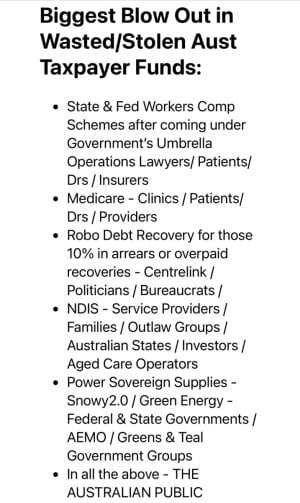New testimonies reveal Centrelink staff's frustrations over ignored concerns on 'dodgy' Robodebt system
- Replies 51
The horror stories behind the infamous Robodebt scheme are still coming out of the woodwork, courtesy of a slew of public submissions by Centrelink employees—past and present.
Unveiled just days before the Royal Commission findings on Robodebt, the raw recollections portray a system that was 'dodgy' from the start.
For those unfamiliar with the term, Robodebt is shorthand for an automated system implemented near the middle of the last decade.
Active from 2015 to 2019, this automated method calculated welfare recipients' alleged debts by matching their reported pay with supposed yearly incomes. The scheme worked by averaging data from the Australian Taxation Office, distributing debt notices to over 443,000 welfare recipients.

However, according to several Centrelink employees, the system was flawed from the get-go. Gareth Mills, a former Services Australia employee, testified that the Robodebt experience had an impact profound enough to turn his once-rewarding job into a nightmare.
In his revelation, he expressed a gnawing frustration towards higher-ups, who allegedly seemed blind to issues arising from the scheme.
'Throughout my experience, I have felt a great sense of frustration that the people who had control of this scheme were missing the key point,' he said.
'The record shows that this scheme was not lawful. Workers undertaking this work had that view from the beginning and shared it with their managers.'
Staff members, aware of the flaws of the system they were expected to uphold, raised their concerns right up the ranks, only to have them fall on 'deaf ears'. If due to callous indifference or intentional wrongdoing, how these concerns were ignored remains to be determined.
Submissions by other long-term Centrelink workers reveal a chilling narrative of alienation.
Employees like Kaye Fagan, who was employed at a customer service centre from 2014 to 2018, recounted how staff were aware that the process behind Robodebt was 'illegal'. She said they were neither warned nor briefed about the new process as well. Ms Fagan eventually left her role following 22 years of dedicated service, no longer willing to be a part of an organisation that 'showed little respect for natural justice'.
Stephen Fuller, a dedicated public servant with experience in both the Department of Social Services and Centrelink, expressed his deep concern regarding the situation. With a commitment to upholding the 'highest standards', Fuller emphasised his disappointment in the way the Commonwealth Public Service has been utilised and managed.
'[It] has destroyed lives and severely diminished the reputation of the service upon which Australian democracy relies,' he said.
Andrea Therese Leck testified before the Royal Commission, recounting her employment with the department in July 2015. Her role involved undergoing training and overseeing the implementation of the Robodebt system, which launched merely two weeks after her training commenced.
During her testimony, Leck revealed that she and her colleagues repeatedly raised concerns about the legality and ethical implications of the process to the department's leadership. Unfortunately, their warnings went unheard, as no action was taken to address the issue.
'A few staff went to the union to advise what was going on, and then we found out there had been a client suicide due to the process,' she shared.
'I am still struggling with this.'
Credit: ABC News (Australia)
Julie Holmes, a dedicated employee across the Department of Social Services (DSS), Department of Human Services (DHS), and Centrelink for over two decades, put it into stark perspective.
'I resigned from work at the age of 55, at least five years before I had intended to,' she revealed, attributing her early departure to the stress of implementing Robodebt, a system she deemed from the get-go as 'legally dubious at best and completely illegal at worst'.

If you or someone you know is experiencing a crisis and requires immediate assistance, please dial triple zero (000) without delay. Another available option is to reach out to Lifeline at 13 11 14, as they offer their services round the clock, every day of the week.
While we are not medical professionals, we are always here to lend an ear. There are, however, several organisations that provide specialised support and education for people with mental illness and their families and carers throughout Australia.
Some of the main groups are listed here in this article.
Hopefully, the Commission's findings lead to reforms that make situations like Robodebt a thing of the past.
Here at the Seniors Discount Club, we empathise with all the individuals who have been victimised by the flaws in the Centrelink system—be they recipients or workers. It is our sincere wish that justice prevails for all those who have suffered the consequences of this unethical practice.
We are keen to hear your thoughts on this matter, so please take a moment to share your insights with us in the comments section below.
Unveiled just days before the Royal Commission findings on Robodebt, the raw recollections portray a system that was 'dodgy' from the start.
For those unfamiliar with the term, Robodebt is shorthand for an automated system implemented near the middle of the last decade.
Active from 2015 to 2019, this automated method calculated welfare recipients' alleged debts by matching their reported pay with supposed yearly incomes. The scheme worked by averaging data from the Australian Taxation Office, distributing debt notices to over 443,000 welfare recipients.

Centrelink staff and public servants who worked through the Robodebt period are 'still struggling' with the impact their work had on clients. Credit: Shutterstock.
However, according to several Centrelink employees, the system was flawed from the get-go. Gareth Mills, a former Services Australia employee, testified that the Robodebt experience had an impact profound enough to turn his once-rewarding job into a nightmare.
In his revelation, he expressed a gnawing frustration towards higher-ups, who allegedly seemed blind to issues arising from the scheme.
'Throughout my experience, I have felt a great sense of frustration that the people who had control of this scheme were missing the key point,' he said.
'The record shows that this scheme was not lawful. Workers undertaking this work had that view from the beginning and shared it with their managers.'
Staff members, aware of the flaws of the system they were expected to uphold, raised their concerns right up the ranks, only to have them fall on 'deaf ears'. If due to callous indifference or intentional wrongdoing, how these concerns were ignored remains to be determined.
Submissions by other long-term Centrelink workers reveal a chilling narrative of alienation.
Employees like Kaye Fagan, who was employed at a customer service centre from 2014 to 2018, recounted how staff were aware that the process behind Robodebt was 'illegal'. She said they were neither warned nor briefed about the new process as well. Ms Fagan eventually left her role following 22 years of dedicated service, no longer willing to be a part of an organisation that 'showed little respect for natural justice'.
Stephen Fuller, a dedicated public servant with experience in both the Department of Social Services and Centrelink, expressed his deep concern regarding the situation. With a commitment to upholding the 'highest standards', Fuller emphasised his disappointment in the way the Commonwealth Public Service has been utilised and managed.
'[It] has destroyed lives and severely diminished the reputation of the service upon which Australian democracy relies,' he said.
Andrea Therese Leck testified before the Royal Commission, recounting her employment with the department in July 2015. Her role involved undergoing training and overseeing the implementation of the Robodebt system, which launched merely two weeks after her training commenced.
During her testimony, Leck revealed that she and her colleagues repeatedly raised concerns about the legality and ethical implications of the process to the department's leadership. Unfortunately, their warnings went unheard, as no action was taken to address the issue.
'A few staff went to the union to advise what was going on, and then we found out there had been a client suicide due to the process,' she shared.
'I am still struggling with this.'
Credit: ABC News (Australia)
Julie Holmes, a dedicated employee across the Department of Social Services (DSS), Department of Human Services (DHS), and Centrelink for over two decades, put it into stark perspective.
'I resigned from work at the age of 55, at least five years before I had intended to,' she revealed, attributing her early departure to the stress of implementing Robodebt, a system she deemed from the get-go as 'legally dubious at best and completely illegal at worst'.
Key Takeaways
- Centrelink staff and public servants have revealed they are still grappling with the impact of the 'Robodebt' system on their clients.
- Many staff members claim they knew the system was problematic and attempted to raise their concerns with superiors, only for those concerns to go unheard.
- Several individuals who took part in the Royal Commission into the system have come forward to share their submissions detailing the profound impact it had not only on themselves but also on their colleagues.
- Some former employees indicated they left Centrelink due to the stress and dissatisfaction associated with implementing the 'Robodebt' system.
If you or someone you know is experiencing a crisis and requires immediate assistance, please dial triple zero (000) without delay. Another available option is to reach out to Lifeline at 13 11 14, as they offer their services round the clock, every day of the week.
While we are not medical professionals, we are always here to lend an ear. There are, however, several organisations that provide specialised support and education for people with mental illness and their families and carers throughout Australia.
Some of the main groups are listed here in this article.
Hopefully, the Commission's findings lead to reforms that make situations like Robodebt a thing of the past.
Here at the Seniors Discount Club, we empathise with all the individuals who have been victimised by the flaws in the Centrelink system—be they recipients or workers. It is our sincere wish that justice prevails for all those who have suffered the consequences of this unethical practice.
We are keen to hear your thoughts on this matter, so please take a moment to share your insights with us in the comments section below.








